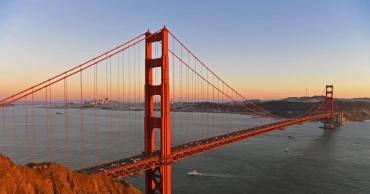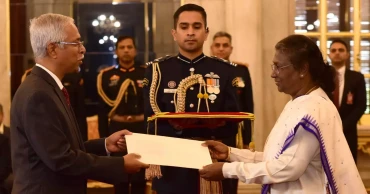diplomacy
Jordan backs diplomacy to end Pakistan-Afghanistan border clashes
Jordan has voiced support for diplomatic initiatives to halt the ongoing violence, saying it is closely monitoring the recent border clashes between Pakistan and Afghanistan that have left several people dead and wounded.
In a statement, the Jordan’s Ministry of Foreign Affairs said it backs all diplomatic efforts aimed at settling conflicts and disputes through peaceful means, according to ministry spokesperson Fuad al-Majali, reports Al Jazeera .
Jordan also underlined the importance of restraint, dialogue, respect for state sovereignty, and adherence to the principles of good neighbourliness, the spokesperson added.
2 days ago
India's Modi likely to find comfort in Trump's return and a shared worldview
Donald Trump’s return to the White House has made many countries anxious and recalculating where they stand with the U.S., but India appears to be welcoming the change that may embolden nationalist leaders like Prime Minister Narendra Modi.
“I know today a lot of countries are nervous about the U.S., let’s be honest about that,” India’s External Affairs Minister Subrahmanyam Jaishankar said over the weekend. India was “not one of them.” A call from Modi “was among the first three calls, I think, that President (elect) Trump took," he added.
A second Trump presidency is likely to play out in New Delhi’s favor, experts say, especially as Modi seeks to reset India’s relationship with the West after recent frictions over his refusal to join sanctions against Russia or condemn its 2022 full-scale invasion of Ukraine. Modi has also been criticized over India's democratic backsliding.
“Trump’s victory means that the Indian policies that have put New Delhi at odds with the West … will no longer be a cause of concern for Washington,” said Michael Kugelman, South Asia director at the Wilson Center.
There could be ruptures on trade, immigration and climate change goals — but on balance, “the return of Trump means that India’s relations with the West – and specifically its most powerful country — will get a boost,” he added.
Modi has sought to cast India as a rising global player with a fast-growing economy that can counter China. But critics say his authoritarian politics and right-wing Bharatiya Janata Party have deeply polarized the country with minorities increasingly marginalized and the right to free speech and press under attack.
When President Joe Biden honored Modi with a state visit last year, he walked a tightrope as activists and groups pressured him to confront Modi over his human rights record. Still, the two leaders rolled out new business deals on defense and technology.
Such concerns won't be an issue with Trump, said Uday Chandra, an expert on South Asia and foreign policy. “He is a refreshing reset from the Indian perspective … he is much more transactional.”
Trump, long an open admirer of Russian President Vladimir Putin, is also likely to be more understanding of India’s strategic partnership with Moscow, which dates back to the Cold War, its record purchases of Russian crude, and its refusal to pick a side in the war in Ukraine. “This was the real sort of thorn in India-U.S. relations over the past two years … but with Trump, I don’t see this being an issue,” Chandra said.
Read: Modi, Trump commit to strengthening India-US ties during phone call: MEA
One hot-button issue is trade. In his first term, trade differences between the two countries came to the fore with Trump calling India the “tariff king” over disagreements on farm goods, Harley Davidson motorcycles and medical devices. In 2019, he canceled the country's special trade privileges and India responded by slapping tariffs on more than two dozen U.S. goods.
This time, Trump wants to impose a “universal” tax of 10% or 20% on all imports and raise tariffs on Chinese goods to 60%. India, which counts the U.S. as its second-largest trading partner, won't be an exception.
“New Delhi will have to do more than just tinkering with its policies to deal with Trump’s emphasis on fair trade,” said C Rajamohan, a professor at the Institute of South Asian Studies in Singapore.
Immigration could turn into a sore point if Trump attempts to also curb skilled migration. Indians have often been the largest group applying for the H1-B work visa but Trump had called the visa program “very bad” and “unfair” for U.S. workers.
Progress on climate change and clean energy could also be hit.
“India and the U.S. have done quite a lot on this front over the past four years — but this is something that could unravel because a Trump administration is more aligned with the fossil fuel industry than with green technology,” said Milan Vaishnav, South Asia Program director at the Carnegie Endowment for International Peace.
Both Trump and Modi embody strongmen tactics, count on an impassioned support base and have ramped up polarization to consolidate votes. And unlike liberal leaders in the West, Trump doesn’t view Modi’s policies at home problematic – or even relevant, said Kugelman.
“They’re both ardent nationalists committed to making their nations stronger at home and abroad,” he added.
Analysts also point to the personal bond between the two. When Trump visited India in 2020, Modi threw him an event in the world's largest cricket stadium.
Read more: BRICS Summit: Putin hosts Xi, Modi, other Global South leaders in move to counter western influence
The year before that, Trump held a massive rally for Modi in Texas and likened him to Elvis Presley for his crowd-pulling power. In his congratulatory post to Trump on X last week, Modi shared photos of the two leaders hugging, smiling and holding hands.
“There’s a bromance between the two,” said Chandra. "But they're also united by a shared worldview — that we are in a post- liberal world and that liberalism as an ideology for conducting global politics is no longer viable. That’s as true in India as it is in America.”
1 year ago
World Insights: After 45 years, closer China-U.S. ties still depend on people
As the world counts down to a new year, the China-U.S. diplomatic relationship is set to welcome its 45th anniversary.
Back in November, Chinese President Xi Jinping and his U.S. counterpart, Joe Biden, held a historic meeting in San Francisco. Many, not just Chinese and Americans, are now hoping that the summit is a new starting point for bilateral relations."It is the convergence of many streams of goodwill and friendship that has created a strong current surging across the vast Pacific Ocean; it is the reaching out to each other by our peoples that has time and again brought China-U.S. relations from a low ebb back onto the right track," Xi said at the welcome dinner during his visit to California in November for the China-U.S. summit meeting and the 30th APEC Economic Leaders' Meeting.
FROM BUDDING TO BLOOMINGFifty-two years ago, a tiny ping-pong ball played a vital part in the budding rapprochement between China and America after more than two decades of estrangement.The real breakthrough in ties came with a public encounter between a pair of ping-pong players during the 1971 World Table Tennis Championships in Japan. Footage caught their friendly exchange, and the unexpected goodwill between the American and Chinese teams soon became the talk of the tournament and preluded a milestone visit leading to the establishment of bilateral diplomatic relations."That seemingly small gesture had a huge symbolic significance," Gene Sykes, chairman of the U.S. Olympic and Paralympic Committee, told Xinhua, adding, "The impact of this event went far beyond the realm of sports. It was the opening for a wide range of collaborations which spanned the scientific, cultural, artistic and educational domains."Today, this chapter in China-U.S. relations, known as "Ping-Pong Diplomacy," still resonates over half a century later. The goodwill, which thawed relations between the two countries, dispelled the specter of the Cold War and brought the two countries together, serving as a vivid example of cooperation trumping estrangement."History has demonstrated that building bridges is a much better strategy than building walls or digging moats" between the United States and China, said Tom Watkins, a former advisor to the Michigan-China Innovation Center."I still remember what 'Ping-Pong Diplomacy' was like between the United States and China in the early 1970s and I think we should try it again," said Stephen Mull, former U.S. acting undersecretary of state for political affairs.
STORYTELLERS, BRIDGE BUILDERSFriendship between people holds the key to sound relations between states, and people from both sides as storytellers and bridge builders can play their part.Their bond has laid the groundwork for bilateral ties, helped navigate the relationship through choppy waters, and will continue to work wonders in the years to come.Despite the tumultuous years in their relations, the Chinese and American peoples at the grassroots level are telling their own stories about each other and emphasize how critical it is to deepen their exchanges, no matter from the business, academic or cultural communities.U.S. opinion polls have shown that the younger generation has a different attitude towards China compared to the older generation, said Warwick Powell, adjunct professor at the Queensland University of Technology."The youths experienced the benefits of exchanges with people from all walks of life and understand that there is no reason why people from different parts of the world cannot find common ground and achieve things together in the interests of everybody," he said.Brooke Leonard, a 32-year-old ping-pong aficionado from Los Angeles, said he has gained so much fun from learning, playing and appreciating the sport. Besides making friends with many Chinese through this sport, he is now recommending it to his American friends and family.In southwest China's megacity Chongqing, a museum dedicated to the Flying Tigers stands to tell a touching tale of Americans and Chinese fighting side by side during wartime and of how grateful the Chinese people are for their bravery and sacrifice.In November, an over 30-member delegation of the Flying Tigers veterans and their descendants visited Kunming, the starting point of "the Hump," a vital airlift route over the Himalayas and the primary way the Allies supplied China between 1942 and 1945 in World War II.Today, memorials, exhibitions and events to honor that chapter in history epitomize the deep friendship between the two peoples that withstood the test of blood and fire. And more than 1,000 Flying Tigers veterans and their families have been invited to visit China.Americans, for their part, always remember the Chinese who risked their lives to save American pilots. Offspring of those American pilots often visit the Doolittle Raid Memorial Hall in east China's Zhejiang Province to pay tribute to the Chinese for their heroic efforts.From U.S. entrepreneurs visiting China, to "Bond with Kuliang: 2023 China-U.S. People-to-People Friendship Forum," and from the delegation of U.S. Flying Tigers visiting China, to the fifth China-U.S. Sister Cities Conference, the Chinese and American peoples have demonstrated good will and a firm friendship, injecting impetus into bilateral ties and cooperation.These heartening stories can help improve the ailing China-U.S. relationship. That is probably the best way to carry on the legacy in the new era.
"THE TIME IS ALWAYS RIGHT TO DO WHAT IS RIGHT"Martin Luther King, a leading figure of the American civil rights movement in the 1950s, once said, "The time is always right to do what is right."The whole world is watching the two major countries, hoping they will continue the positive momentum in their relations from the San Francisco summit and engage in more "maintenance work" regarding their relationship.There are numerous reasons to make the China-U.S. relationship work. Ordinary people on both sides want this. The world also wants this."As a planet, we are facing multiple challenges -- the need to nourish the hungry, manage climate change, sustain economic growth and job creation, and maintain global stability. We hope there will be a positive reset and improved relations between the two major countries," said Grant Kimberley, a sixth-generation soybean farmer and marketing director of the Iowa Soybean Association.The future depends on joint efforts from both peoples, particularly from the younger generation. For China-U.S. relations, the hope lies in the people, the foundation rests on the people, and the future lies with the youth.To increase bilateral exchanges, particularly between the youth, China has announced a plan to invite 50,000 young Americans to China on exchange and study programs in the next five years. Meanwhile, a growing number of young Americans have joined the Flying Tigers Friendship Schools and Youth Leadership Program, launched by the Sino-American Aviation Heritage Foundation in 2022.These tangible efforts, step by step, have helped nurture the seeds of friendship, mutual understanding, and cooperation on both sides."The more exchanges, whether they're educational, sports or music, or any kind of exchange between our two countries ... if we can learn to do that, I think we can break down barriers and open up communication that is just phenomenal," said Connie Sweeris, the American table tennis champion who took part in the ice-breaking trip to China in 1971."We have been partners in war, now let us always be partners in peace," said Mel McMullen, a Flying Tigers veteran.
2 years ago
BRICS Summit 2023 unveils potential geopolitical paradigm shift: Modern Diplomacy
The upcoming summit of BRICS, a group of major emerging economies – Brazil, Russia, India, China and South Africa, holds significant implications for global geopolitics, reported Modern Diplomacy on Friday (August 11, 2023).
The summit has its central agenda revolving around the launch of a common currency among the member nations, the report said, adding that the move, aimed at reducing the dominance of the U.S. Dollar in international trade, has the potential to reshape the geopolitical landscape and challenge American supremacy.
"For decades, the U.S. Dollar has reigned supreme in global trade and transactions, affording the United States unparalleled economic and geopolitical leverage. The U.S. has been using dollar and economy as tools to coerce and pressurize its adversaries," it said. "Imposing sanctions was a common tool against its rivals to achieve political goals."
2023 BRICS Summit: Lot of interest in how new members are chosen and which countries would be eligible
There has been a growing sentiment against the U.S. hegemony, supremacy and coercion. "The proposed launch of a BRICS common currency or de-dollarization aims to alter this status quo, potentially diminishing the American influence and power that is closely tied to the dollar's dominance," it said.
"BRICS is a strong Alliance and plays a huge role in Global Trade and Investments, and above all, it is above American influence," it added. "BRICS is in a position to transform the global economy in total. This move represents a growing discontent with the U.S. dollar's global dominance and a push toward Eastern superiority."
BRICS Summit: PM Hasina’s meetings on sidelines yet to be confirmed, says foreign ministry spokesperson
2 years ago
Ukraine’s Zelenskyy at center of last day of high-level diplomacy as G7 looks to punish Russia
World leaders ratcheted up pressure Sunday on Russia for its war against Ukraine, with Ukrainian President Volodymyr Zelenskyy at the center of a swirl of diplomacy on the final day of the Group of Seven summit of rich-world democracies.
Zelenskyy's in-person attendance at one of the world's premier diplomatic gatherings is meant to galvanize attention on his nation's 15-month fight against Russia. Even before he landed Saturday on a French plane, the G7 nations had unveiled a slew of new sanctions and other measures meant to punish Moscow and hamper its war-fighting abilities.
Ukraine is the overwhelming focus of the summit, but the leaders of Japan, the United States, the United Kingdom, France, Germany, Canada and Italy, as well as the European Union, are also working to address global worries over climate change, AI, poverty, economic instability and nuclear proliferation.
Also Read: Ukrainian president meets with world leaders at G7 as Russia claims a key victory in the war
Two U.S. allies — South Korea and Japan — continued efforts Sunday to improve ties that have often been hurt by lingering anger over issues linked to Japan's brutal 1910-1945 colonization of the Korean Peninsula. Japanese Prime Minister Fumio Kishida and South Korean President Yoon Suk Yeol visited a memorial to Korean victims, many of them slave laborers, of the Aug. 6, 1945, atomic bombing.
Washington wants the two neighbors, both of which are liberal democracies and bulwarks of U.S. power in the region, to stand together on a host of issues, including rising aggression from China, North Korea and Russia.
Bolstering international support is a key priority as Ukraine prepares for what's seen as a major push to take back territory seized by Russia in the war that began in February last year. Zelenskyy's visit to the G7 summit closely followed the United States agreeing to allow training on potent American-made fighter jets, which lays the groundwork for their eventual transfer to Ukraine.
Also Read: Zelenskyy says ‘Bakhmut is only in our hearts’ after Russia claims controls of Ukrainian city
"Japan. G7. Important meetings with partners and friends of Ukraine. Security and enhanced cooperation for our victory. Peace will become closer today," Zelenskyy tweeted after his arrival.
U.S. national security adviser Jake Sullivan said that President Joe Biden and Zelenskyy would have direct engagement at the summit. On Friday, Biden announced his support for training Ukrainian pilots on U.S.-made F-16 fighter jets, a precursor to eventually providing those aircraft to Ukraine.
"It is necessary to improve (Ukraine's) air defense capabilities, including the training of our pilots," Zelenskyy wrote on his official Telegram channel after meeting Italian Premier Giorgia Meloni, one of a number of leaders he talked to.
Zelenskyy also met on the sidelines of the summit with Indian Prime Minister Narendra Modi, their first face-to-face talks since the war, and briefed him on Ukraine's peace plan, which calls for the withdrawal of Russian troops from the country before any negotiations.
India, the world's largest democracy, has avoided outright condemnation of Russia's invasion. While India maintains close ties with the United States and its Western allies, it is also a major buyer of Russian arms and oil.
Summits like the G7 are a chance for leaders to put pressure on one another to align or redouble their diplomatic efforts, according to Matthew Goodman, an economics expert at the Center for Strategic and International Studies think tank in Washington. "Zelenskyy's presence puts some pressure on G7 leaders to deliver more — or explain to him directly why they can't," he said.
Russian Foreign Minister Sergey Lavrov criticized the G7 summit for aiming to isolate both China and Russia.
"The task has been set loudly and openly: to defeat Russia on the battlefield, but not to stop there, but to eliminate it as a geopolitical competitor. As a matter of fact, any other country that claims some kind of independent place in the world alignment will also be to suppress a competitor. Look at the decisions that are now being discussed and adopted in Hiroshima, at the G7 summit, and which are aimed at the double containment of Russia and China," he said.
The G7, however, has vowed to intensify the pressure.
"Russia's brutal war of aggression represents a threat to the whole world in breach of fundamental norms, rules and principles of the international community. We reaffirm our unwavering support for Ukraine for as long as it takes to bring a comprehensive, just and lasting peace," the group said in a statement.
Another major focus of the meetings was China, the world's No. 2 economy.
There is increasing anxiety that Beijing, which has been steadily building up its nuclear weapons program, could try to seize Taiwan by force, sparking a wider conflict. China claims the self-governing island as its own and regularly sends ships and warplanes near it.
The G7 said they did not want to harm China and were seeking "constructive and stable relations" with Beijing, "recognizing the importance of engaging candidly with and expressing our concerns directly to China."
They also urged China to pressure Russia to end the war in Ukraine and "support a comprehensive, just and lasting peace."
China's Foreign Ministry said that "gone are the days when a handful of Western countries can just willfully meddle in other countries' internal affairs and manipulate global affairs. We urge G7 members to ... focus on addressing the various issues they have at home, stop ganging up to form exclusive blocs, stop containing and bludgeoning other countries."
The G7 also warned North Korea, which has been testing missiles at a torrid pace, to completely abandon its nuclear bomb ambitions, "including any further nuclear tests or launches that use ballistic missile technology," the leaders' statement said.
The green light on F-16 training is the latest shift by the Biden administration as it moves to arm Ukraine with more advanced and lethal weaponry, following earlier decisions to send rocket launcher systems and Abrams tanks. The United States has insisted that it is sending weapons to Ukraine to defend itself and has discouraged attacks by Ukraine into Russian territory.
"We've reached a moment where it is time to look down the road again to say what is Ukraine going to need as part of a future force, to be able to deter and defend against Russian aggression as we go forward," Sullivan said.
Biden's decisions on when, how many, and who will provide the fourth-generation F-16 fighter jets will be made in the months ahead while the training is underway, Biden told leaders.
The G7 leaders have rolled out a new wave of global sanctions on Moscow as well as plans to enhance the effectiveness of existing financial penalties meant to constrain President Vladimir Putin's war effort. Russia is now the most-sanctioned country in the world, but there are questions about the effectiveness.
Russia had participated in some summits with the other seven countries before being removed from the then-Group of Eight after its 2014 annexation of Crimea.
The latest sanctions aimed at Russia include tighter restrictions on already-sanctioned people and firms involved in the war effort. More than 125 individuals and organizations across 20 countries have been hit with U.S. sanctions.
Kishida has twice taken leaders to visit to a peace park dedicated to the tens of thousands who died in the world's first wartime atomic bomb detonation. Kishida, who represents Hiroshima in parliament, wants nuclear disarmament to be a major focus of discussions.
The G7 leaders also discussed efforts to strengthen the global economy and address rising prices that are squeezing families and government budgets around the world, particularly in developing countries in Africa, Asia and Latin America.
The group reiterated its aim to pull together up to $600 billion in financing for the G7's global infrastructure development initiative, which is meant to offer countries an alternative to China's investment dollars.
2 years ago
Indian High Commission hosts ‘Open House’ interactions
High Commission of India hosted an ‘Open House’ on Tuesday for the Indian community members to address their grievances and receive suggestions on consular services.
Indian High Commissioner Pranay Verma joined the interactions and listened to the queries and concerns of the community members.
He assured the community members that their grievances and suggestions would be taken into consideration and appropriate actions would be taken to address them.
The ‘Open House’ was organized to provide a platform for the Indian community members to discuss various issues pertaining to consular services and to seek practical solutions to resolve them.
2 years ago
Dean of Diplomatic Corps hosts reception for diplomats
Moroccan Ambassador to Bangladesh Majid Halim, also the Dean of the Diplomatic Corps, hosted a reception at his residence Thursday.
He arranged the reception marking the end of Mission and departure of the Ambassadors - Enrico Nunziata, Ambassador of the Italian Republic, Mustafa Osman Turan, Ambassador of the Republic of Turkey and Ito Naoki, Ambassador of Japan, with the presence of members of the diplomatic corps.
Read: Moroccan Minister calls for Bangladesh-Morocco joint ventures in potential sectors
It was also arranged to welcome newly arrived envoys - Marie Masdupuy, Ambassador of the Republic of France, Pranay Verma, High Commissioner of the Republic of India and Abdulla Ali Khaseif Alhmoudi, Ambassador of the United Arab Emirates.
Over 20 diplomats stationed in Dhaka were present at the ceremony of handing over of the silver crests.
It is a tradition for the dean of the diplomatic corps to host such events. The event lasted for an hour from 3pm.
3 years ago
'Mutual visits and increasing economic, cultural exchanges indicators of powerful Bangladesh-UAE ties'
UAE Ambassador to Bangladesh Abdulla Ali ALHmoudi has said the ties between his country and Bangladesh are based on the principles of cooperation and mutual respect.
"The partnership between the countries and peoples reached a new height in recent years. The mutual visits of the leaders and officials of the two countries, and the ever-increasing trade, economic and cultural exchanges, are powerful indicators of the strength of bilateral relations in various fields," he added.
"The UAE and Bangladesh have enjoyed deep-rooted historical relations since 1971, and both of our governments strengthened the bilateral relations in various sectors," he said while celebrating the UAE's 51st National Day on Thursday in Dhaka.
Read: UAE keen to expand air connectivity with Bangladesh
The embassy held a grand reception at a hotel, bringing a taste of home to the members of the UAE community in Bangladesh.
Expatriates' Welfare and Overseas Employment Minister Imran Ahmad attended the programme as the chief guest.
Ministers, ambassadors, heads of diplomatic missions, members of parliament, high government officials, business persons, media personalities, and personalities from academic and social institutions also attended the event.
"The UAE is one of the most resilient countries globally in handling and responding to the Covid-19 pandemic. The country ranked 11th on the nation brand index due to its successful handling of Covid-19 and pioneering achievements in science and education, such as the successful Emirates Mars Mission," Abdulla Ali said.
Read: Bangladesh seeks wider cooperation with UAE
"The UAE supports diplomacy over conflict, partnership over unilateralism, and dialogue over confrontation. The UAE believes that the world cannot tolerate more polarisation and confrontation and that the coming decades need more communication, integration and cooperation in the political, economic, technological, health and food fields."
Imran said Bangladesh and UAE enjoy an age-old fraternity and time-tested friendship. "These historical ties had further been strengthened and deepened over time with religious and cultural commonalities and economic cooperation."
Home Minister Asaduzzaman Khan Kamal also spoke at the programme.
3 years ago
Bangladesh seeks ease of visa process, investment from Guatemala
Foreign Minister Dr AK Abdul Momen has proposed to ease the Guatemalan visa application process for Bangladeshi nationals, and explore the possibility to sign a visa waiver agreement for the diplomatic and official passport holders between the two countries.
During a telephone conversation with the Foreign Minister of Guatemala, Mario Adolfo Bucaro Flores, Momen also encouraged investment from Guatemala in Bangladesh.
The Guatemalan foreign minister called Momen today and discussed various matters of mutual cooperation in the bilateral and multilateral fronts.
The foreign minister of Guatemala sought Bangladesh’s support for his country’s nomination of “Holy Week in Guatemala” to be included in UNESCO’s list of Intangible Cultural Heritage of Humanity.
Read: Protesters burn part of Guatemala’s Congress building
Momen assured him of Bangladesh’s full support, considering the excellent bilateral relations between the two countries.
During the conversation, Foreign Minister Momen expressed satisfaction over the ever-growing bilateral relations between the two friendly countries, based on similar values and principles.
Flores hoped to develop a much stronger relationship with Bangladesh in the coming days.
Foreign Minister Momen hoped for continuous support from Guatemala in bringing a sustainable and permanent solution to the Rohingya crisis by ensuring the urgent return of the forcibly displaced Rohingyas to their homeland in Myanmar.
He also extended an invitation to his Guatemalan counterpart to visit Bangladesh.
Read: Guatemala official: 44 deportees tested positive for virus
The Guatemalan foreign minister also invited Momen to Guatemala.
The two foreign ministers also reiterated their commitment to work together in the multilateral front to address global issues like tackling climate change, displacement of people, ensuring sustainable development, among others.
3 years ago
India eyes stronger, deeper cooperation with Bangladesh: President Murmu
President of India Droupadi Murmu on Monday said Bangladesh occupies a special place in India’s ‘neighbourhood first’ policy and she looks forward to “stronger and deeper” cooperation between the two countries in all aspects in the coming days.
Murmu recalled the joint celebrations of “Mujib Year” marking the birth centenary of Father of the Nation Bangabandhu Sheikh Mujibur Rahman, the golden jubilee of Bangladesh’s War of Liberation and 50 years of the establishment of diplomatic ties.
She made the remarks when newly appointed Bangladesh High Commissioner to India Md Mustafizur Rahman presented his credentials to the President at Rashtrapati Bhavan.
Mentioning the immense political will to take forward the relations, Murmu recalled her recent meeting with the Prime Minister Sheikh Hasina this September in New Delhi and later in London.
She has also mentioned that Bangladesh is India’s largest trade partner in South Asia and highlighted the largest visa operations of India in Dhaka.
Read: Dictionary.com chooses `existential' as word of the year
By welcoming and congratulating the new envoy, President Murmu has said that India-Bangladesh relations are bounded by language, culture, and history and the unique tie is forged in shared sacrifices.
High Commissioner Rahman appreciated for the opportunity to present the credentials and conveyed greetings from Bangladesh President Abdul Hamid and Prime Minister Sheikh Hasina.
The high commissioner has said Bangladesh remains grateful to the Government and people of India for extending their moral and material support during the War of Liberation fought under the leadership of Bangabandhu in 1971.
The Indo-Bangladesh cooperation had, in fact, begun on the battlefield of 1971, he recalled.
He said that the India-Bangladesh relation has reached a new height and it is described as a model of “neighbourhood relations”.
The envoy assured the Indian President that he would try to further expand and consolidate bilateral cooperation.
Read: Work together to keep 1971 legacy alive: Indian envoy at 'Maitri Alumni Reunion'
He underscored Hasina’s persistent efforts to further promote regional and sub-regional cooperation on a win-win basis.
He thanked the government of India for inviting Bangladesh to the G-20 Summit.
Rahman takes up his India assignment after serving as Ambassador and Permanent Representative of Bangladesh to the UN Offices, WTO and other International Organizations in Geneva from 2020-22.
He was also Bangladesh's ambassador to Switzerland.
3 years ago



















